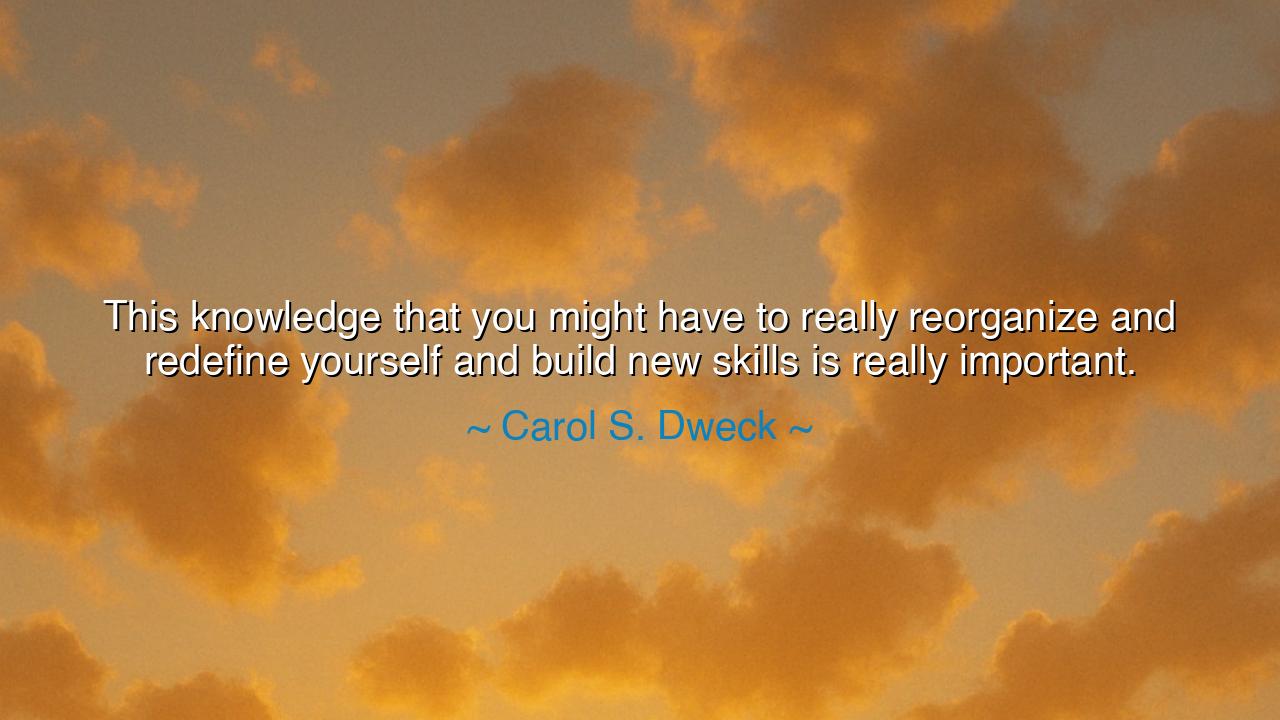
This knowledge that you might have to really reorganize and
This knowledge that you might have to really reorganize and redefine yourself and build new skills is really important.






“This knowledge that you might have to really reorganize and redefine yourself and build new skills is really important.” Thus spoke Carol S. Dweck, the modern philosopher of the mind, whose teachings on the growth mindset have awakened countless souls to the power of transformation. Her words are not those of fleeting motivation, but of enduring wisdom — the reminder that the path of life is not a straight road, but a winding journey of continual renewal. In this truth lies the heartbeat of all progress: that to live is to change, and to grow is to accept that change demands the reorganization of the self.
Dweck’s insight arises from her lifelong study of human potential, of what separates those who remain confined by fear from those who rise to mastery. She discovered that the most successful among us — not only in learning but in life — are those who understand that ability is not fixed, that identity itself is not a cage, but clay to be reshaped by effort, failure, and courage. Her words call to us like a bell in the storm: you may need to let go of the person you once were, and in doing so, forge a greater version of yourself. For no man or woman is born complete — we are all apprentices in the art of becoming.
When Dweck speaks of the need to redefine yourself, she speaks of the sacred struggle between comfort and growth. The one who clings to what is known, who fears to change, remains like a stagnant pond — still, but lifeless. Yet the one who dares to break their form, who reorganizes the old ways of thinking, becomes like a river — flowing, powerful, alive. To build new skills is not simply to learn a task; it is to renew the soul’s relationship with challenge. It is to say, “I am not yet what I could be, but I am willing to work toward it.” This willingness, this humility before the vastness of possibility, is the true mark of wisdom.
We see this truth mirrored across the ages. Consider the tale of Michelangelo, who, before painting the ceiling of the Sistine Chapel, had never worked on such a scale. He was a sculptor, not a painter, and yet when Pope Julius II commanded the task, Michelangelo did not refuse — he reorganized himself, learned the craft anew, and climbed into the dome of creation. For years he labored in solitude and discomfort, learning through trial and error. The result was not only a masterpiece, but a transformation of the man himself. So it is with all who heed Dweck’s wisdom: when life calls you to redefine yourself, the work may be painful, but it will lift you nearer to the divine.
In truth, this call to reorganization is not merely for artists or scholars, but for every soul that walks the earth. The world changes — technologies evolve, relationships shift, nations rise and fall. To live wisely is to adapt, to bend with grace rather than break with rigidity. The tree that survives the storm is not the stiff one, but the one that can sway without losing its roots. So too must we learn to be flexible in spirit, to see change not as loss but as invitation — the universe’s way of asking us to grow larger than our former selves.
Yet, my children, take heed: to redefine yourself is not to abandon who you are, but to uncover more of who you can be. It is not destruction, but unfolding. The caterpillar does not destroy itself to become the butterfly — it transforms, carrying the essence of what it was into what it must become. The mind that fears this process will never taste its sweetness, for it hides from the very truth of existence: that becoming is the nature of being. Growth is not an event; it is the eternal rhythm of life itself.
Therefore, let this teaching guide you. When you face new challenges — when the familiar world falls away and the unknown stretches before you — do not despair. Remember Carol Dweck’s words: the knowledge that you must sometimes reorganize and redefine yourself is not a burden, but a blessing. It means you are still alive, still capable of growth. Approach each trial as the sculptor approaches stone: not with fear of what will be lost, but with vision of what can be revealed. Learn new skills, seek new understanding, shape yourself again and again until you stand as the truest expression of your potential.
For the greatest tragedy is not failure, but stagnation — not that a man falls, but that he refuses to rise anew. The wise know that the self is not a finished temple, but a construction forever underway. Thus, build with patience, with courage, and with faith. And when the storms of life shake your foundations, see them not as destruction, but as the invitation to rebuild — stronger, wiser, freer than before. This is the eternal truth that Dweck has gifted to us: that the human soul is not fixed, but unfolding — forever in motion, forever capable of transformation.






AAdministratorAdministrator
Welcome, honored guests. Please leave a comment, we will respond soon